TU/e vacancies for academic staff exclusively for women for the time being
In its search for new scientists, TU/e will focus its recruitment activities solely on suitable female candidates from July 1. This measure will apply for one hundred percent of all vacancies until the end of 2020. After that period, the university will annually review what percentage of unfilled vacancies will be covered by the measure. Yesterday, the University Council asked the Executive Board to ensure that the measure will not lead to discrimination or intimidation.
All female newcomers will fall under the so-called Irène Curie Fellowship-program and will receive an extra starter package specifically tailored to them. For each new Fellow in this program, the TU/e Board will make an additional 100,000 euros available they can use for their own research line, along with a special mentoring program for this new intake.
“We attach great importance to equal respect and opportunities for women and men,” explains Rector Frank Baaijens of TU/e. “And it has long been known that a diverse workforce performs better. It leads to better strategies, more creative ideas and faster innovation. That’s why we’ve had measures in place for years to increase the low percentage of women among our academic staff, but we’re progressing too slowly. We’re aware that we are suffering from an implicit gender bias. We are now using the fact that plans to expand our academic staff considerably in the coming years can be used as a means to make a big step forward in one fell swoop.”
Discriminatory
Ellen Konijnenberg, member of staff faction PUR, voiced some reservations concerning the positive advice for the measure on behalf of the Commission Staff Policy during Monday afternoon’s University Council meeting. She said that the council initially considered the measure to be discriminatory and had therefore reacted negatively to it. Konijnenberg: “However, we acknowledge that previous measures have not led to the desired results in promoting diversity, and that more strict measures – such as the one currently under consideration – are necessary in order to achieve the goal of a balanced representation. We also believe that an increase in the number of female assistant professors, associate professors and full professors will have a positive effect on attracting female students.”
The commission also made some recommendations. It believes the university should on the one hand take action to guarantee the quality of the female staff it intends to employ and not to subject this matter to any discussion, and on the other hand make clear that possible discrimination and intimidation resulting from this measure will not be tolerated. Dean Baaijens said that this will definitely be ensured.
The commission also asks the Board to train the selection committee to look at knowledge, talent and expertise of female candidates in a different manner in order to “break through the bias of a male-dominated environment and to better appraise their potential, which certainly is equal to that of men,” according to Konijnenberg.
In addition, the commission is worried that the measure will do nothing to reduce work pressure in the short term and that it will possibly even lead to more work pressure. It therefore asks the Execute Board to “urge the management units to take come up with concrete plans to monitor work pressure and to appoint ambassadors, and to take concrete measures.”
Reopend
On 1 July the Irène Curie Fellowship program will start and it will run for at least five years. During that time, the university will have over 150 permanent vacancies to fill. Whether or not all of these will fall under the program is yet to be seen. However, for the first year and a half, it is set at 100 percent. After that, the program will be evaluated annually and the percentage will be adjusted if necessary.
Vacancies for which a good female candidate has not been found within six months will be reopened outside of the program. Nevertheless, it will remain the case that the application committee must nominate at least one female candidate and one male candidate. All in all, TU/e wants at least half of all newly-appointed assistant professors to be women. The minimum for associate professors and full professors will be 35 percent. The measure has been checked against European legislation. It allows to target recruitment from among underrepresented groups.
The University Council wants to be informed about the progress and the results of the measure within six months. The council’s request to evaluate the measure after two years was tightened by Rector Baaijens. The Executive Board wants the evaluation to take place after one year already.
Irène Curie Followship-program
Irène Curie (officially Joliot-Curie, 1897-1956) won the Nobel Prize for Chemistry in 1935 and was an active advocate for women’s rights in education and science. Irène Curie was the daughter of the equally famous scientist Marie Curie, the first female Nobel Prize winner. Baaijens: “Irène Curie is a symbol for the next generation of female academics that we want to attract.”


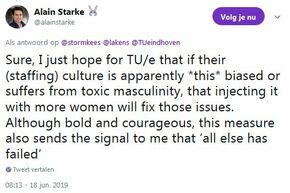
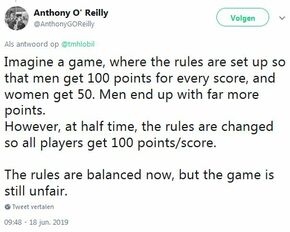

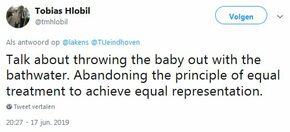
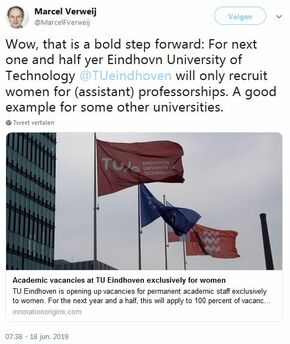
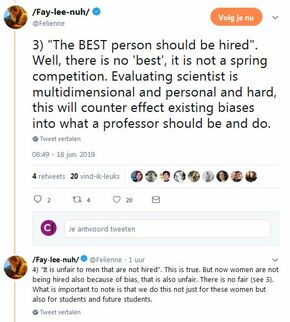
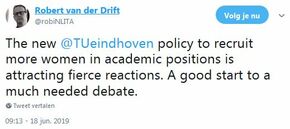
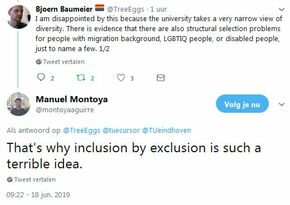
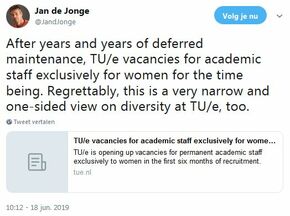
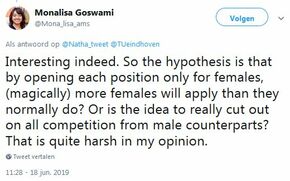
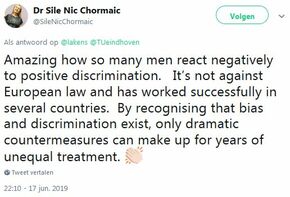
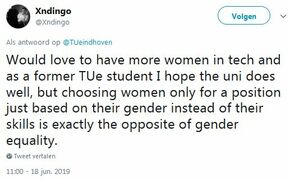
Discussion